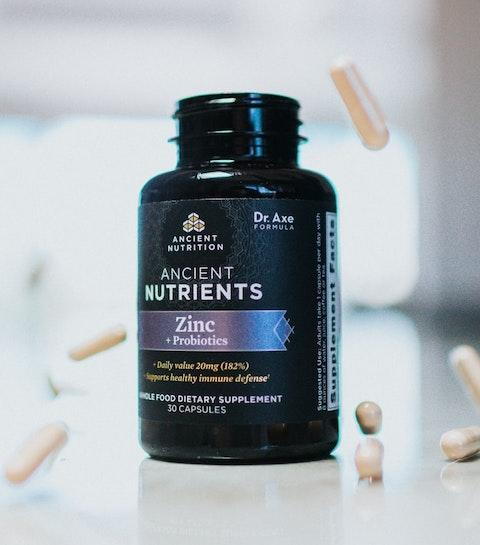Micronutrients (Vitamins & Minerals) That Help Immune System During COVID-19

- posted: Nov. 25, 2020
Micronutrient Protocol for COVID-19
(Summary of an article in the Townsend Letter)
COVID-19 has taken the world by storm.
While we wait for a vaccine to be released in the next few months, the question remains: what do we do in the meantime?
Aside from taking the appropriate safety measures—which includes mask wearing, standing 6 feet apart and frequent hand washing—is there anything else we can do as a society?
According to research as highlighted in the Townsend Letter, there is: good nutrition and micronutrients.
“Optimal nutrition along with micronutrient support is historically considered the most effective way to limit infections and especially COVID-19.”
Micronutrients are “vitamins and specific minerals that are critical to the proper structure and functioning of numerous proteins, enzymes, physiological processes, and signaling pathways within the body.”
Micronutrients and vitamins can boost immunity. For example, vitamin C was reported to be effective at eradicating an influenza virus and it has been shown that ascorbic acid in vitro inactivates viruses.
It has also been shown that in the treatment of Severe Acute Respiratory Syndrome (SARS), nutrients can play a prominent role.
Micronutrients such as
1) Magnesium (a cofactor in any DNA repair mechanisms) and
2) Zinc (a cofactor for Cu/Zn superoxide dismutase) are required to secure and protect genome stability and sustain body functions such as immunity.

Vitamin C
During this pandemic of COVID-19, vitamin C supplementation is crucial. It is well documented in the literature that vitamin C is rapidly depleted during an infectious disease and if not replenished poor outcomes will be observed. Low levels of vitamin C are associated with respiratory tract infections, especially pneumonia. Therefore, when dealing with a serious respiratory disease like pneumonia, vitamin C becomes a necessary supportive measure. Low blood levels of ascorbic acid are consistently found in patients with viral diseases.
Effective dosing of vitamin C as an anti-viral molecule is dependent upon achieving sustained high plasma concentrations of vitamin C.
One of the main concerns of oral vitamin C consumption is whether or not oral vitamin C can achieve maximum therapeutic blood plasma levels against viral infections of the lungs. Orally, the maximum levels that can be reached, should be at least 4.05mg/dL. By keeping a constant high vitamin C plasma level, the body pool will reach its maximum tissue storage. As a result, during a viral disease at the onset, vitamin C will be available to quench the pathogen infection.
Six grams per day of vitamin C abolished the decline of vitamin C concentration by the common cold.
Vitamin D
The release of pro-inflammatory cells with COVID 19 is dependent on the virulence of the virus.
Vitamin D modulates our immune system to a point that can prevent excessive expression of these inflammatory molecules and stimulates expression of anti-microbial proteins that protect the cells lining the respiratory tract, which protect against lung infections. Furthermore, vitamin D induces gene expression that in turn can enhance immunity. Vitamin D either directly or indirectly regulates the expression of up to 5% of the human genome or about 1250 genes.
Recent studies show that supplementing with vitamin D specifically increases the expression of genes coded for immune function. There is one caveat for vitamin D3 supplementation. The action of vitamin D3 depends upon available magnesium levels, since magnesium is required in 800 crucial biochemical steps.
In general, vitamin D treatment was linked with a substantial degree of protection against acute respiratory tract infection among those who were deficient in vitamin D.
Ideal blood levels of vitamin D is 80 – 100 ng/ml. Most people should supplement with 5000 IU’s/day. If your levels are very low you can supplement with 10,000 IU’s/day for 2 to 3 months then down to 5000 IU’s/day.
Magnesium
Approximately 800 enzyme systems require magnesium (Mg) for their optimal functioning. It is well documented that Mg deficiency is common reaching even 80% in some groups. Mitochondrial dysfunction is attributed to low levels of Mg. Six out of eight steps that produce ATP (adenosine triphosphate) in the mitochondrial via the Krebs cycle require adequate levels of Mg (magnesium is a cofactor for ATP production). ATP is our fuel, it keeps our cells functioning properly.
Mg also provides anti-influenza functions when at optimum levels. The potential role of Mg in the development and activation of the immune system is profound. Mg is a cofactor in most immune responses. Dosage of Magnesium should be 400 – 2000 mg/day.
Zinc
The essentiality of zinc on immune function has been well documented. The results of more than 3 decades of work indicate that zinc deficiency rapidly diminishes antibody- and cell-mediated responses in both humans and animals. Zinc deficiency has been linked to immune dysfunctions. Moreover, zinc supports innate immunity and facilitates normal development and function of immune cells.
A review of 13 randomized placebo-controlled trials revealed that, when taking zinc immediately upon appearance of common cold symptoms, there was a significant reduction not only in the duration but also the severity of symptoms.
Studies show excess zinc is not stored in the body, thus consumption of this mineral, through diet or supplementation, is important in maintaining the integrity of the immune system. Zinc deficiency is responsible for serious respiratory infections worldwide.
Zinc is vital so as to 1) safeguard the respiratory lining by inhibiting any pathogen entry, 2) balance immune cells function, 3) inhibit viral replication and more. Zinc dosage should be 10mg 2X/day.
Learn more by calling us today at 812-945-4500!
Location
Find us on the map
1st Choice Health & Wellness
2441 State St #10
New Albany, IN 47150
Hours of Operation
9:00 am - 12:00 pm
2:00 pm - 6:00 pm
2:00 pm - 6:00 pm
9:00 am - 12:00 pm
2:00 pm - 6:00 pm
9:00 am - 12:00 pm
2:00 pm - 6:00 pm
9:00 am - 1:00 pm
Closed
Closed

